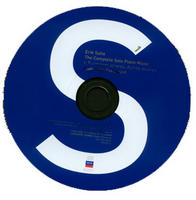 I was sitting in our car on Monday night in Baie-Comeau, Québec, waiting for the ferry to arrive to take us to Matane on the other side of the St. Lawrence Seaway. As I had about 45 minutes to while away, I put the first CD in Jean-Yves Thibaudet's 5 disk set of Satie's piano music and listened to the 3 Sarabandes - the first three tracks on the record.
I was sitting in our car on Monday night in Baie-Comeau, Québec, waiting for the ferry to arrive to take us to Matane on the other side of the St. Lawrence Seaway. As I had about 45 minutes to while away, I put the first CD in Jean-Yves Thibaudet's 5 disk set of Satie's piano music and listened to the 3 Sarabandes - the first three tracks on the record.I was not familiar at all with these pieces before I bought this CD, and initially tended to skip them or not pay them much mind as they were followed immediately by the well-known Gymnopedies.
But since I have heard them a few times, I find them in some ways more satisfying than the more well-known pieces.
They are less attractive on the surface, lacking the lilting rhythm of the Gymopedies, and appear to be incomplete or oddly shaped on first listenings. The connection with the music of John Cage is made quite apparent here, and it is easy to understand why Cage held Satie in such high regard. By subverting conventions of time and form in subtle ways, these pieces stand out in sharp relief from the piano music of Satie's contemporaries. Here, the music seems to have uncoupled itself from time. There's a spaciousness that leads you to pay as much attention to gaps between the notes as to the music itself.
I sat in the Parc des Pioneers adjacent to the bay of this extraordinary town, a blend of natural Canadian beauty and heavy industry, listening to this music. I felt out of time and place myself. French music, played by a French pianist in a wholly French town - yet part of North America.
A moment that will remain with me.
No comments:
Post a Comment